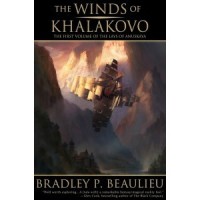Currently reading
Middlemarch: An Authoritative Text, Backgrounds, Reviews and Criticism (A Norton Critical Edition)
The Magic Mountain
Love in the Time of Cholera
The Winds of Khalakovo (Lays of Anuskaya, #1)
 Simply stated, the only book to evoke the same je ne sais quoi that I felt while reading Dune for the first time, since the time that I actually read Dune for the first time.
Simply stated, the only book to evoke the same je ne sais quoi that I felt while reading Dune for the first time, since the time that I actually read Dune for the first time.Very much a high fantasy in Clute & Grant's terms, the story has plenty of dunetude, but is not derivative, and involves the crossing of geopolitical conflict (regarding a monopoly by one particular feudal lord over a crucial commodity--though it's much more subtlely handled than Herbert's overstated spice melange) with the colonialist's efforts to contain a subordinated local population, with a dispute among the subordinated population between peaceful and violent resistance tendencies, with an overlay of theological jarre between the colonialist's ancestor worship and the colonized's general samsara & ahimsa ('cept for the incendiary sect, 'course). Regarding Clute & Grant, further, there's some express indication that the story partakes of the traditional Land afflicted with Wrongness--except that the Land is basically water and the Wrongness is basically Right--it's bizarre and kickass.
Great: the politically subordinated population's religion is rendered ontological within the setting by the story's unfolding, whereas the religion of the colonizers is very carefully contained within the dialogue of its proponents.
Greater: the clever inversion of Lee's Magical Negro stock character, wherein a character from the oppressed minority population finds redemption through the efforts of a character from the majority population, where that redemption specifically concerns what might legitimately be termed the former character's racist attitude toward the latter character. It's quite a bit more complicated than that, and the latter character is not present simply to guide the former out of her racism.
Greatest: the setting is precisely defined, where setting involves the natural & supernatural order, the geopolitical structures, the economic basis. The story arises directly and necessarily from the exigencies of the setting--both with respect to the geopolitical & economic story and to the parallel and not unrelated supernatural narrative. There's plenty of cool settings out there (n00bs split setting into so-called "world-building" and "magicke system," but therein lies the path of error), but not every cool setting manifests a readable story. As in Dune, the particularities of the setting here drive the narrative inexorably forward, and it's wonderful to watch.
Doubleplusgood marks for no dark lords or inane prophetics or virgin farmboy heroics or impenetrable prologue.
Russian names and untranslated terms will invoke certain details from 19th century Russian literatures without need for further description, at least for those readers who carry that with them; the narrative will be very familiar. For anyone else, the setting will be rendered alien thereby. For the latter type of reader, it may be too much, considering the alterity that the volume otherwise presents. But for the former, it will likely strike the perfect match of alien and familiar.
Otherwise, a curious mix of concepts. There's dead scientific theory adopted with modifications as governing supernaturalisms (aether theory, platonist elemental doctrine). Hezhan is apparently chinese for nuclear bomb. Qiram is arabic for some kind of thin curtain. Adhiya seems to be sanskrit for escape. One key character is revealed to be doubled, a real world version and an immaterial simulacrum, with the implication that the meeting of the two variants ends the universe. Hell if I know how it all fits together, and doubtful that it's attempting to work through any real historical analogues--but it's all ontological to the setting, rather than subject to epistemological debate among personalities.
Told through three disciplined perspectives. Tasteful cover design. Includes maps & dramatis personae. Bad points for no glossary (though attentive readers can piece together the various bits by scribbling out their own glosses), sometimes inexplicable chapter breaks, and brevity. Overall, very much anticipating the sequels.
Highly recommended for literate persons.





